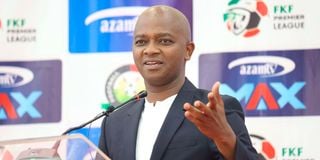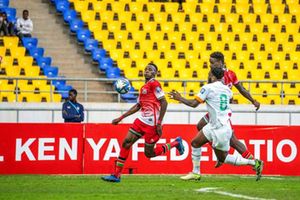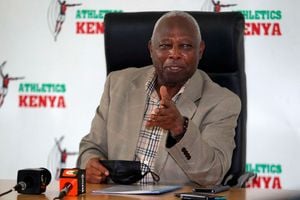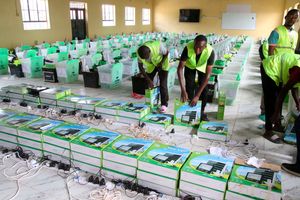
Football Kenya Federation President Nick Mwendwa.
A workshop organised by the National Olympic Committee of Kenya (NOC-K) to lay the groundwork for Kenya’s participation in the 2026 Youth Olympics in Dakar, and the 2028 Los Angeles Olympics, started yesterday in Murang’a, but given that Olympics is a multi-sport championship, the chaotic manner in which local sports are run makes nonsense of such initiatives.
Leadership wrangles, personality contests, ineptitude and malfeasance among officials, and plain incompetence is common in local sports federations.
Sportsmen and women are particularly paying a huge price for mismanagement of local sports federations by incompetent officials, some of whom have overstayed their mandate.
Such officials take advantage of ambiguity or lack of clarity in constitutions of the federations they lead with regard to term of office.
Most local sports federations are not compliant with the 2013 Sports Act that, among other things, stipulates how local sports activities should be run, and issues guidelines on conduct of elections.
Yesterday, Cabinet Secretary for Youth Affairs, Creative Economy and Sports, Kipchumba Murkomen, marked 45 days in office since taking over from Ababu Namwamba, but the problems bedevilling Kenyan sports federations appear far from over.
Athletics Kenya, Badminton Kenya, and Football Kenya Federation (FKF) are scheduled to conduct long overdue elections, but there is no clear roadmap to the elections as of now, pointing to the gravity of the problem.
Kenya Aquatics, Kenya Rugby Union (KRU), Kenya Volleyball Federation (KVF) and Kenya Motor Sports Federation (KMSF) are among the local federations that have held elections, but have been in turmoil, with incessant leadership wrangles.
Even after World Aquatics, the global body that runs swimming activities, intervened and set a roadmap for elections at the local federation, a case at the High Court seeking the interpretation of the provisions of the Sports Act with regard to the federation’s elections, is up for ruling today.
Some members of the Kenya Aquatics appealed to the Sports Dispute Tribunal to annul elections overseen by World Aquatics last year. Their plea was granted last month, throwing local swimming activities into further disarray.
Barely 11 months into office, cracks have emerged in KVF’s National Executive Committee (NEC). In July this year, nine out of 15 members demanded the resignation of its president, Charles Nyaberi, pending disciplinary action.
Waithaka Kioni was elected KVF’s chairman in 1998, and served until his death in April last year, when his deputy Nyaberi succeeded him. Nyaberi defeated David Kilundo in elections held on August 19 last year to become KVF’s new president. But things got worse for him following his appointment as team manager of
Kenya women’s volleyball team to 2024 Paris Olympic Games on May 12.
Nyaberi’s deputy Paul Bitok, who is the former head coach of the women’s national team, had appointed an assistant to coach Japheth Munala.
Appointment of the duo caused an aproar, prompting Bitok to decline the position. Nyaberi stayed put until the SDT revoked his appointment as team manager, and he was replaced by Lilian Miduda.
Football has witnessed relative calm, but it has come at the cost of suspension from all football activities by world football governing body Fifa in 2021 “for government interference in the running of football activities.”
Yesterday, Football Kenya Federation (FKF) Electoral Board was unveiled in Nairobi, with a promise to conduct the federation’s elections by mid-December.
The board, chaired by Hesbon Owilla, was unveiled at Villa Rosa Kempinski in Nairobi, and will issue election timeline tomorrow.
Lawyer Marceline Sande is the board’s Secretary General, while other members are former AFC Leopards chairman, Dan Mule, Communication Consultant, Alfred Ngang’a, and Sports Journalists Association of Kenya (Sjak) president James Waindi.
There has been no peace in sports like cricket, badminton, motorsports, rugby and volleyball.
Athletics Kenya, under retired lieutenant general Jack Tuwei, has not held elections for the last eight years after some of its members went to court to challenge a review of its constitution.
Moses Tanui and nine others had sought to stop the implementation of the new Athletics Kenya constitution that had been ratified and adopted at AK’s Annual General Meeting on April 27, 2016. Tanui termed the document “illegal, null and void.”
After a long legal battle, the High Court in March this year declared AK’s current office illegal, and ordered the officials to facilitate a further review of AK’s constitution as per 2013 Sports Act to pave the way for elections within 90 days. Tuwei’s team appealed , and their wishes were granted, paving way for yet another lengthy process.
Cricket Kenya and Kenya Rugby Union held elections, but power struggles between officials have persisted.
Cricket Kenya went to polls in February 2022, in a move many thought would usher in a new era in the local game after many years of wrangles that affected the national team’s performance.
Manoj Narshi Patel was elected chairman. But the wrangles are back. Manoj and other board members have differed on many issues, including the appointment of coach Dodda Ganesh from India in August.
Badminton World Federation (BWF) suspended Kenya indefinitely in March 2021 and ordered warring parties at Badminton Kenya to organise fair and transparent elections. The suspension has locked Kenyan players out of major championships.
This week, Nation Sport will chronicle the crisis in leadership of local sports federations, and the heavy price that athletes pay.










